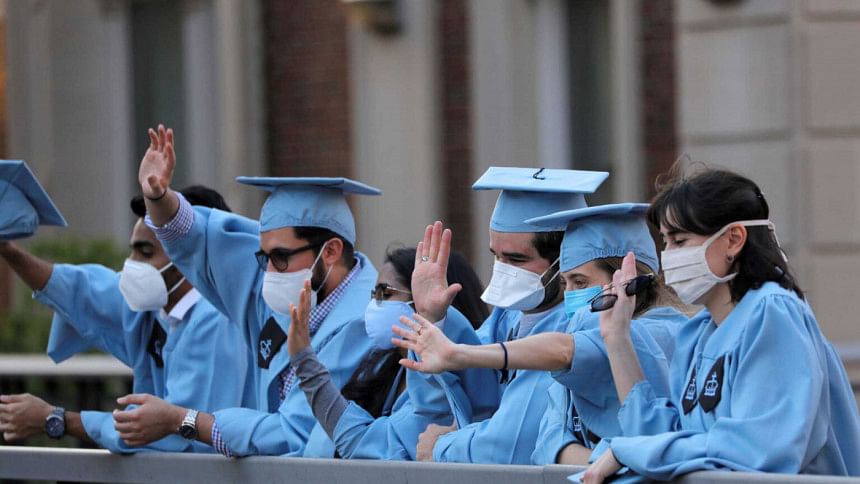The life of an international graduate is that of constant learning

University life is referred to as a critical turning point in one's life. In all certainty, and in my experience, it is perhaps more than that. The totality of attaining a quality education—from the process of applying for different programmes to attaining a degree, and everything in between—is fundamental in determining the kind of people we turn out to be later in life. Values are shaped. Socially ingrained ideas do clash. Beliefs are questioned.
For international students, the challenge is undeniably more complicated. We have the opportunity to study at the best institutions in the world, not simply because of our individual merits, but also due to the financial backing of relatively well-off family members—this brings with it a dual sense of responsibility. For one, we must surely be humble in admitting that we are indeed immensely fortunate to have this experience, and do our best in selflessly reinvesting the knowledge we attain, towards the very community that has provided us with this opportunity. We are lucky because a majority of the deserving do not get such opportunities. But simultaneously, we are expected to change the world—in other words, be the change-makers, as is used by many in the media to define the educated youth of today.
I wholeheartedly concur with the dual nature of what is expected from us—we must surely find a way to make the world a better place, both in principle and practice. Privilege brings with it a certain sense of duty, and it is in fulfilling this duty that we find a path to give back to our communities. A study by Harvard University and the Asian Development Bank, done several years ago, found that 6.7 percent of the total global population has a university or college degree; therefore, our privilege must not be taken for granted. Keeping this in mind, imagine what a small minority the international students are, when compared to the total population of Bangladesh. Importantly though, the reality is that, in fulfilling these duties, we tend to make mistakes. But the imperative aim is to constantly learn from those mistakes.
As I write this, I come back from another day at work. I graduated with a Bachelor of Arts degree from the University of Toronto in 2018, and for the past three years I have been working at a Canadian bank. You see, banking was the last thing on my mind when I graduated. My interests lie in global affairs, public policy and journalism. In reflecting on my four years at university, I now realise that I made key miscalculations in planning, practising and training myself for a post-graduation career in a field of my choosing. In recognising these shortcomings, I now try and find a path to navigate forward.
First and foremost, I failed to focus on my mental health as part of my education. We tend to consider mental health as a subsidiary, rather than an essential component of our education. Added to that are homesickness and a feeling of being distant from the ordinary norms of a foreign land. For university students, this includes building and sustaining relationships—whether it be friendships, professional or, yes, romantic. Being in your early 20s is complicated as it is, but in deepening these social ties, we tend to sometimes forget what makes us happy and healthy. In addition to all this, there is perhaps a societal need to reinvent oneself to adapt to a foreign culture. You can be the most supporting friend in the world to another person, and that can surely improve your mental health. Yet, in hindsight, I do believe that a large part of university life should be dedicated towards your own mental well-being, while concurrently being there for your friends. This is something that we tend to overlook, and with time, I realise the negative effects of constantly side-lining my mental health. This tendency spills over into one's professional career as well, in areas ranging from productivity to job satisfaction. So, irrespective of what is happening during the elusive exam season or in our relationships with friends, it is fundamental for us to focus on ourselves, too. And we can do so by staying true to our personal values.
Secondly, a highly intense environment in classrooms and a competitive atmosphere mean that getting a degree or a high GPA is simply not enough in boosting our chances to be the so-called change-makers. I failed there, too. For reasons unknown to me now, I refrained from developing sustainable relationships with my professors and instructors, and this surely left a gaping hole in both planning and implementing what I wanted to achieve. Building a cordial and working relationship with instructors is not only crucial in driving student development and academic growth, but vital in our quest to establish long-term connections for personal progress. Furthermore, cultivating these networks allow students to create a comprehensive plan for their future. On most occasions, without the guidance from experienced personnel in fields which we want to engage ourselves in, it is next to impossible to move up the ladder. Therefore, developing amicable relationships with academics and specialists who are already working in areas which are of interest to us, is undoubtedly important.
Finally, attaining co-curricular or work opportunities while studying at university—that, too, in the fields which we want to navigate towards—is another essential component of university life. Of course, sometimes we do not have an option but to work in a job that we do not necessarily like, in order to pay the bills, but that should not deter us from participating in activities that in the long-run can support a career pivot towards what interests us. We owe it to ourselves to follow in the direction that we are passionate about; and by doing so, we can truly acquire a sense of wholescale satisfaction. I regret not taking the time to do the things that I loved when I was a student. But life cannot simply be about regrets, so I have now taken it upon myself to focus on my failings as a student, learn each day by reflecting on these shortcomings, and do so with an unrelenting desire to not simply move, but to march forward.
To students and young graduates of today, I say this: frustrations, depression, anxiety, and a lack of satisfaction can make your days difficult. But what we must develop now is a sustained plan for where we see ourselves in the future, rather than simply regretting past decisions or complaining about the present. I would like to end with a quote which I saw on Instagram a couple of days ago: "Depression isn't always dark rooms and crying endlessly; sometimes, it's getting up, going to work, and smiling and laughing all day and then coming home to sit quietly, doing little to nothing until it's time to go to bed". Perhaps this is what many in our generation currently feel or are going through, and the pandemic has surely exacerbated these circumstances. But with the belief that by reflecting on what we did not do and simultaneously looking towards the future, we can surely learn to be what we truly want to be.
Let's discredit the notion that ours is a generation that wants things handed to them on a platter, and let's truly be constant learners, both in successes and failures. And in the process, let's change the world!
Mir Aftabuddin Ahmed is a banking professional based in Toronto, Canada.

 For all latest news, follow The Daily Star's Google News channel.
For all latest news, follow The Daily Star's Google News channel. 



Comments